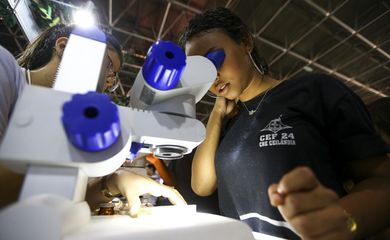
The Chamber of Deputies concluded today (25) the voting of Provisional Measure 1061/2021 that creates the Auxílio Brasil. The program, which replaces Bolsa Família, changes some criteria for receiving the benefit, with additional incentives linked to sports, academic performance and productive insertion. The MP also creates the Alimenta Brasil program, which will replace the Food Acquisition Program (PAA), which serves family farmers. The text now goes to the Senate for analysis.

The base text was approved by 344 votes in favor and none against. Opposition parties signed an agreement to vote in favor of the rapporteur's opinion, Marcelo Aro (PP-MG).
The deputies voted and approved a single highlight, to include in the law the Single Registry for Social Programs of the Federal Government (CadÚnico), an electronic public record of socioeconomic information on low-income families. The amendment, authored by deputy Eduardo Barbosa (PSDB-MG), was approved by 187 votes to 115.
Deputy Marcelo Aro's report was presented with a series of changes to the text sent by the government. Among other points, Aro included in the MP values of benefits defined by a decree that regulated the program. For the Early Childhood Benefit, the amount presented was R$130 and for the Family Composition Benefit, the amount was R$65.
Families in a situation of poverty, whose monthly per capita family income is between R$ 105.01 and R$ 210, will become eligible for Brazil Aid; and families in extreme poverty, with monthly per capita family income equal to or less than R$ 105.
The values are different from those foreseen in the decree that regulated the MP, which fixed the income of extreme poverty up to R$ 100, and of poverty between R$ 100.01 and R$ 200. The practical effect of the change was to expand the universe eligible.
After pressure from opposition parties, Aro also withdrew the part that allowed beneficiaries of the social program to contract payroll loans. The proposal provided for up to 30% of the income to be committed.
In presenting his opinion, Aro said that, despite the efforts of the previous administrations to assist people in situations of economic vulnerability, there are currently 17 million families in poverty and extreme poverty in the country.
“Currently, we have 17 million families in poverty and extreme poverty. It is worth noting that the majority are, unfortunately, in a situation of extreme poverty, a condition in which severe food insecurity and difficulty in accessing basic citizenship rights, such as the right to decent work, prevail”, he said.
The program provides for three types of benefits: the Early Childhood Benefit, which will be paid to families with children up to 3 years of age; the Family Composition Benefit, intended for families whose composition includes pregnant women, nursing mothers or people aged between 3 and 21 years old; and the Extreme Poverty Overcoming Benefit, paid to families in extreme poverty, whose monthly per capita family income, even added to the previous financial benefits that may have been received, is equal to or less than the value of the extreme poverty line.
There is also a transition complement that will be given to families benefiting from the Bolsa Família Program who have had a reduction in the total financial value of the benefits received, as a result of fitting into the new benefit payment structure.
In addition to these benefits, the program also institutes Esporte Escolar allowances; Junior Scientific Initiation Scholarship; Citizen Child; Rural Productive Inclusion and Urban Productive Inclusion, classified as “incentives to individual effort and emancipation”.
According to the government, the average value of the benefit is R$ 217.18, but there will be a supplement so that the amount reaches the minimum of R$ 400. This supplement, however, by decision of the government, will be temporary and will be valid until December of next year.
The vote was preceded by negotiations in the Plenary around the conversion bill, which included the participation of the Minister of Citizenship, João Roma, who is a licensed federal deputy.
"It took months of work for a text that goes a long way, readjusting levels of poverty and extreme poverty and stipulating targets for reducing poverty rates," said Roma.
Even in favor of the approval of the bill, opposition deputies criticized the extinction of the Bolsa Família program. One of the arguments is that the new program does not take into account the policies already structured by Bolsa Família and which involve assistance at the Social Assistance Reference Centers (Cras).
“[It was dismantled] A whole network of information about each family in each municipality. An entire assistance structure that has existed for nearly two decades. Bolsa Família was a structured project, which is linked to the health and education policy”, said deputy Marcelo Freixo (PSOL-RJ)
Freixo also criticized the forecast to pay the supplementation of the benefit by the end of 2022. In the deputy's assessment, the government's forecast of giving the complementation of the aid only until the end of next year shows that "the government's proposal has an electoral nature ”.
“In our opinion, of all opposition deputies, Bolsa Família was a project that should be expanded. We should be voting here for the higher value of Bolsa Família and the coverage of the number of people and not an electoral pix”, he said.
The rapporteur of the provisional measure, Deputy Marcelo Aro (PP-MG), said that the new program will bring advances in social assistance and should expand the number of beneficiaries from 14 million to 20 million families. Spending on the social program is also expected to increase from R$34.7 billion this year to R$85 billion next year.
"We are closing the queues. Everyone who had a repressed demand for Bolsa Família will immediately receive Brazil Aid," he said.
* Feature updated at 6:44 pm
Text translated using artificial intelligence.





